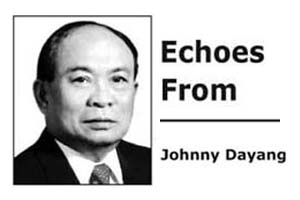BY JOHNNY DAYANG
*
WHETHER a matter of convenience or necessity, the Rodrigo Roa Duterte administration, if its proposals push through as planned, should have added four more departments to the Executive by the time the President’s term expires.
Already, Congress has passed the Department of Information and Communication Technology (DICT) and the Department of Human Settlements and Urban Development (DHSUD). DICT was enacted on June 9, 2016 while the DHSUD law was on Feb. 14, 2017.
On the pipeline, the President wants two more department to be enacted, namely the Department of Overseas Filipinos (DOF) and the Department of Disaster Resilience (DDR). And if rumors are correct, both chambers of Congress favor the creation of the Department of Water, the Department of Fishery, and the Department of Mines.
Creating more departments to address specific government reforms should be construed as a positive step. The only downside to this, though, is the fiscal burden that must be faced as soon as the agencies are constituted. In simple terms, the full-blast operation of four departments instantly translates to seventy-two regional offices.
Beyond a burgeoning bureaucracy caused by expansion, having too many departments can result in complex and at times overlapping functions that cause further complications in the way government transactions are processed. Instead of reducing red tapes, unwanted creativity on the part of crooked individuals in public service often translates into more corruption.
President Duterte’s strategy to classify the bureaucracy to ensure productivity and competence has also its bright side. Still, the idea of instilling order in departments without encroaching on the functions of other agencies is intricate and laborious. To ensure the whole State is synchronized, the bandmaster must have the sense where the ship of state is going.
There is no argument that any national leadership, no matter how pure the intention, cannot achieve a fool-proof machinery. The presidency does not address solely what the people clamor; he also explores the bureaucratic labyrinth using resources, including manpower, and information that are not available to ordinary folk.
Beyond creating departments, Duterte, in his recent SONA, also rolled out significant, development-oriented economic initiatives. Among the notable goals are the Corporate Recovery and Tax Incentives for Enterprises Act; Financial Institutions Strategic Transfer Act; Rural, Agricultural, and Fisheries Development Financing System Act; the long-delayed Modernization Act of the Bureau of Immigration; the upgrading of the Bureau of Fire Protection; and the creation of the National Disease Prevention and Management Authority.
Again, in turning these ideas into productive channels, the State must take a long view on how best to equip the agencies fiscally. Amid the pandemic, loans are only a temporary remedy.


